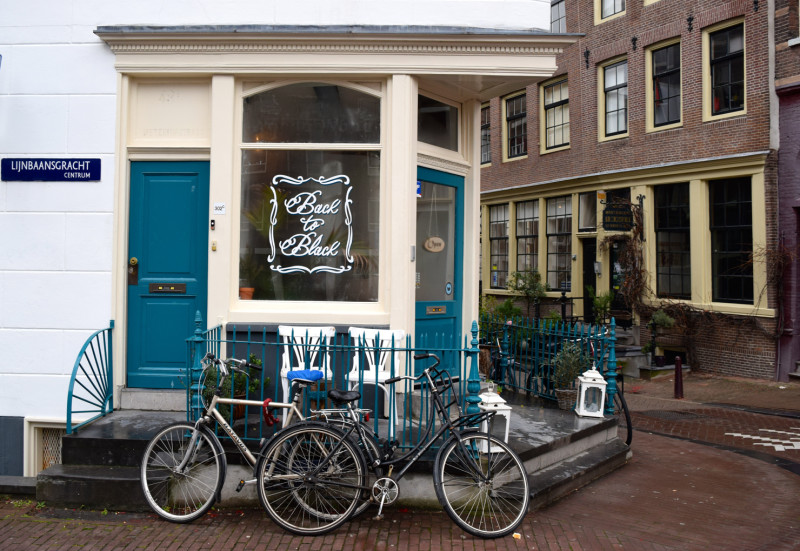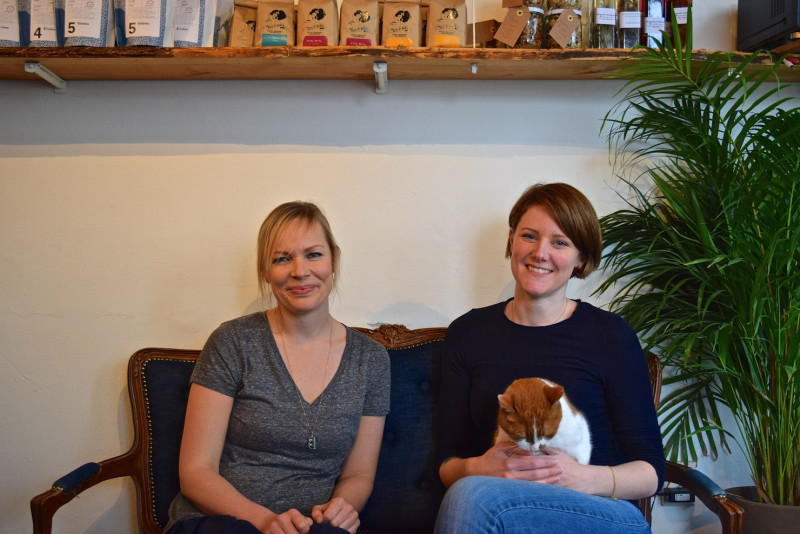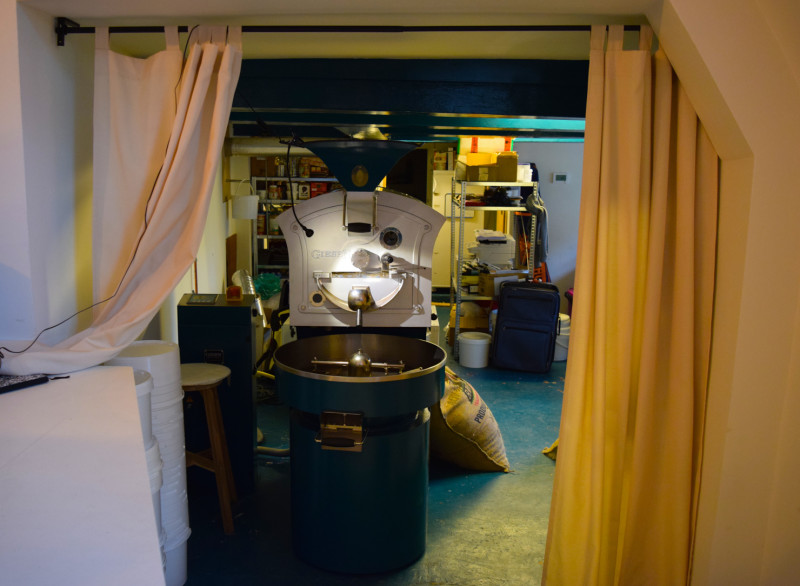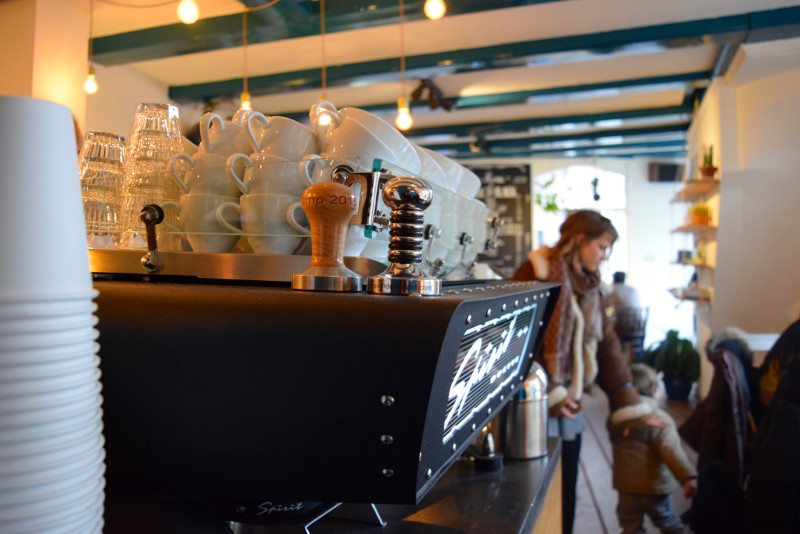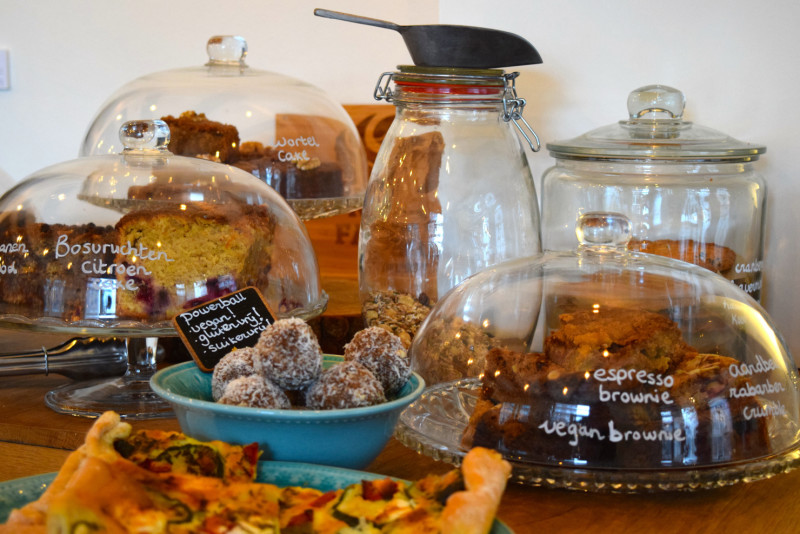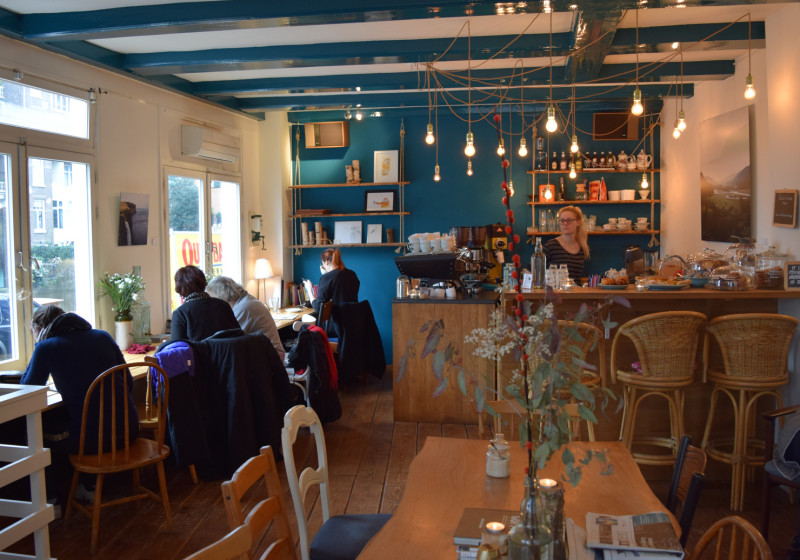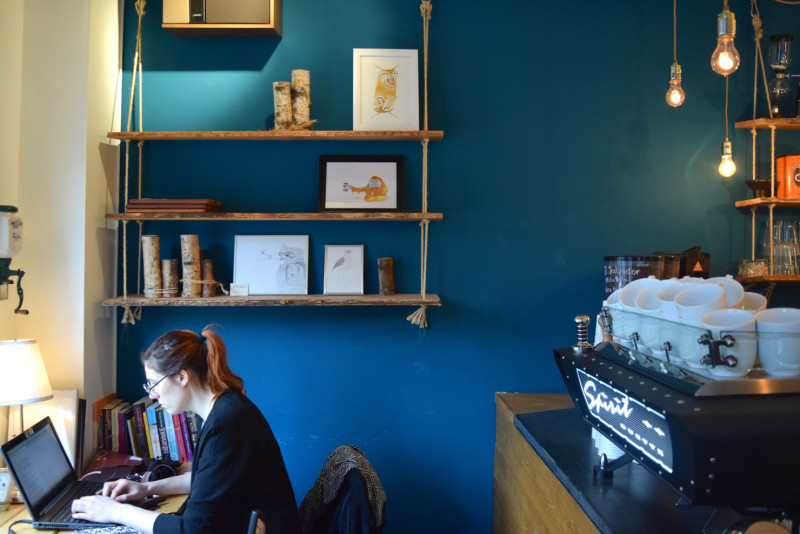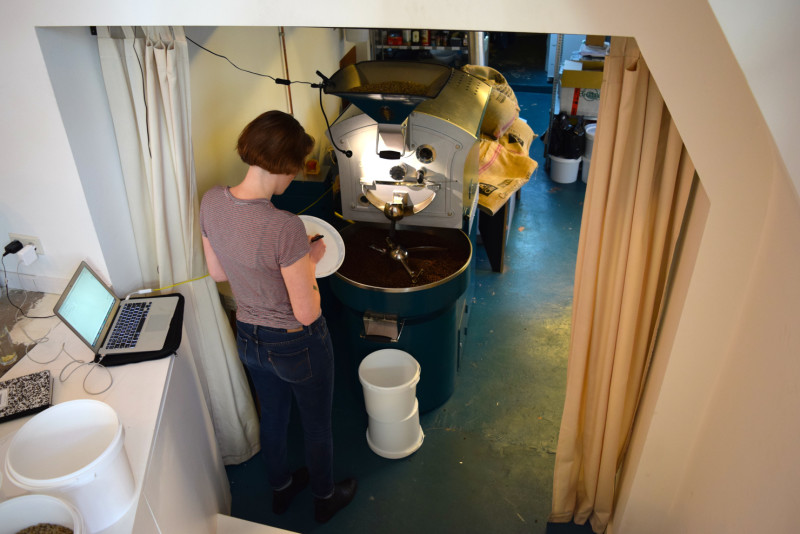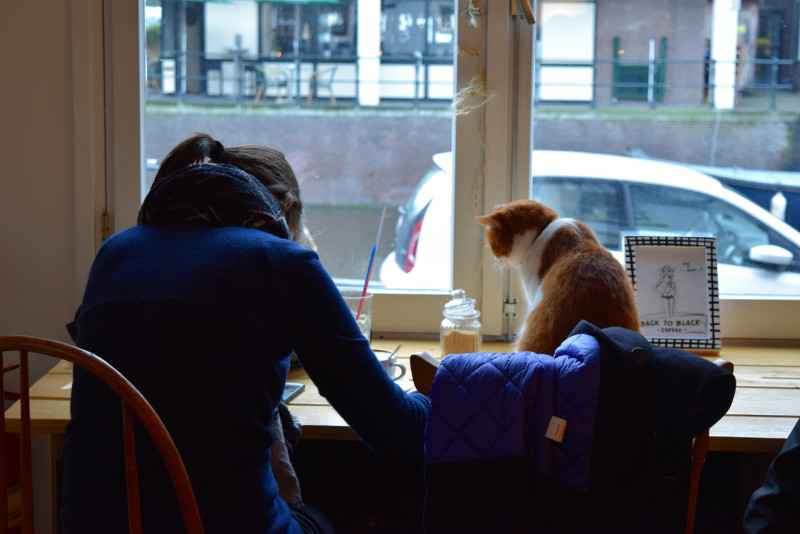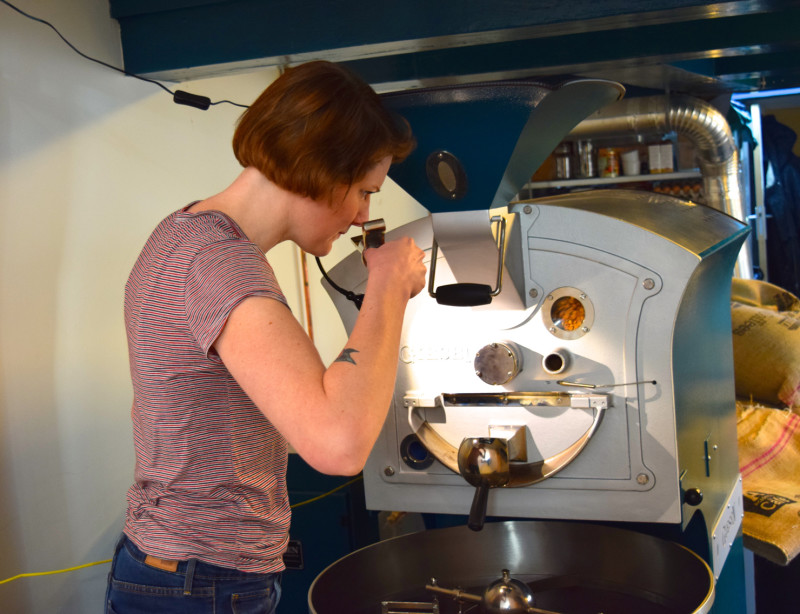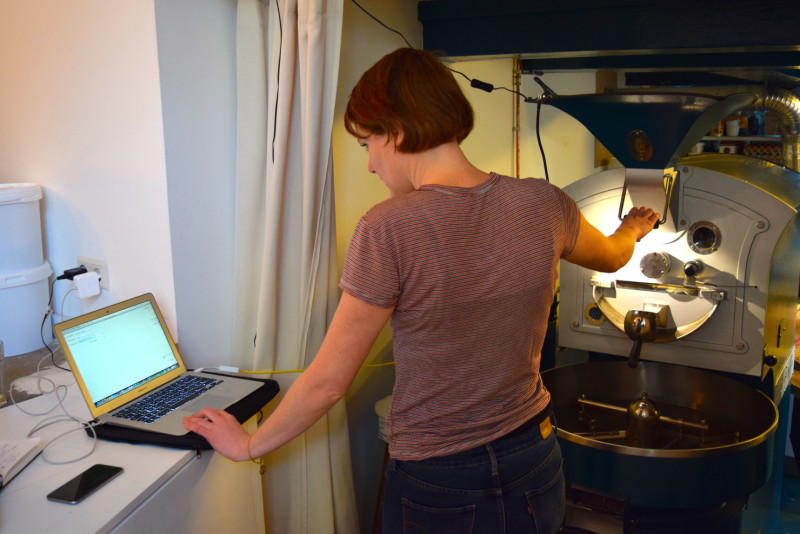A New Wave cafe owned and run by two women is as rare in Amsterdam as a week without rain. It’s not that women here aren’t active in the coffee industry, nor that they aren’t entrepreneurs. Still, for now at least, it is predominantly men found in these roles.
The reasons for this would warrant some handwringing and social study. But it is not at present a preoccupation for Inge Bulthuis and Noortje Vlutters, co-founders and co-owners of Back to Black. They simply have been too busy at their Amsterdam cafe (which opened in July 2014) to stop and strike Rosie the Riveter poses. And this past November, their business became even more progressive: Back to Black put a Giesen W6 roaster in the basement and, in so doing, Bulthuis became the only woman roasting coffee in the Dutch capital to this reporter’s knowledge. (Corrections to the contrary are warmly welcomed.)
Bulthuis’ interest in roasting began years ago while working at Brandmeesters, the two-decade-old Dutch company whose name translates as “roast masters.” Her management position, however, afforded no opportunity to experiment with, much less master, that skill. Nor did a barista stint at Espressofabriek. But by then, Back to Black was ready to open its own doors, and Bulthuis was eager to become her own boss.
“When you really start doing it yourself a lot, that’s the biggest, quickest learning process,” she says of roasting.
She is fast, too, to praise Scott Rao’s The Coffee Roaster’s Companion. “That’s really a roaster’s bible,” Bulthuis remarks, saying it was still useful to her even after taking a roasting course at the Berlin Coffee Festival.
Time spent observing how her friends at White Label and Stooker Roasting Company do their work were of lasting value, she says. Yet, Bulthuis also finds that “some people are a little bit secretive”—one roaster holds his hopper so close, he’s quite “the alchemist.” And Bulthuis says she can feel self-conscious when another roaster visits while Cropster software is running on her open laptop.
“Of course you want to stand out through your [roast] profile, and you want to do it a little bit different than the others,” she elaborates. “[As for] the specialty coffee bars, if importers have great coffee, they all want to buy it. So it often happens that you buy exactly the same coffees, and the only way you can stand out is by roasting it just a little bit different.”
For now, Back to Black’s roasting takes place in their low-ceilinged basement. The space is tight but still accommodates an electrostatic filter, used to minimize smoke and smell, and doubles as a prep area for the homemade sweets and savories that Vlutters oversees.
Current roasting output is about 20 kilos per week. Early 2016’s menu includes a Vista Bella from El Salvador and a Coko and an Iwacu from Rwanda, all three prepared for both espresso and filter. Besides being served upstairs, the coffee is available for purchase in 250-gram and 1-kilo packages. The Biotre bags, chosen for their better biodegradability, sit on a shelf beside those of Stooker and neighboring roastery Sweet Cup, both of which Back to Black has regularly sold.
For their own label, the long-term goal is wholesale. So far, Dutch coffee subscription services Koffiejuffrouw and Roast are clients, and swaps with other roasters—for example, Nossa Familia Coffee in Portland, Oregon—are underway.
Before roasting, Back to Black had already become as much a hangout for locals as a destination for coffee connoisseurs. Situated between the Rijksmuseum and the Heineken Experience, it is also ideal for tourists in need of a rest or a jolt. From their business objectives published on Crowd About Now, the crowdfunding platform that helped them amass 18,000 euros in startup investments, it’s easy to see how the cafe’s present-day situation reflects once-dreamt-of ambitions.
At the bar, a two-group Kees van der Westen Spirit is capably operated alongside a Mahlkönig Guatemala Lab, two Anfim Super Caimano Barista grinders, and a Marco Über boiler. The array of filter apparatuses includes Chemex, AeroPress, V60, siphon, and French press. Five baristas are employed part-time.
The venue, which fits 25, is frequently full enough to fog up the windows and keep Binkie, the cat, playing musical chairs. There’s a ship’s hull-like effect in the room, created by its narrow shape, old wooden floor planks, and prominent ceiling beams. Three rattan barstools evoke a nautical vibe that is more Florida shuffleboard social than Dutch East India Company, and they make for a striking contrast with the back wall, painted a vibrant teal.
The color matches that of the custom-finished Giesen downstairs and quashes the assumption by a coffee-industry employee who, on learning of Bulthuis and Vlutters’ interest in the machine, took to teasing. They recall: “He was making jokes with all the guys, [saying] ‘Oh, you wanna have a pink roaster? You wanna have a pink roaster?’ ”
Vlutters has since become curious about roasting herself. She is relatively new to the industry, though she has benefited from plenty of patient, one-on-one barista training from Bulthuis, whom she has known for 21 years. (The two met as 10-year-olds in Girl Scouts—perhaps a source of their self-determination.)
“I would like to learn a new thing, and I see how she’s enthusiastic about it. But I’ll let her first start to set [the roasting business] up. And I [don’t want to be in the way] like, ‘What are you doing, what are you doing?’ ” Vlutters laughs. If she does take it up, Vlutters could effectively double the city’s population of female coffee roasters.
Back to Black is located at Weteringstraat 48, Amsterdam. Visit their official website and follow them on Facebook, Twitter, and Instagram.
Karina Hof is a Sprudge staff writer based in Amsterdam. Read more Karina Hof on Sprudge.
The post Back To Black Amsterdam: Coffee Bar And Concept Store appeared first on Sprudge.


